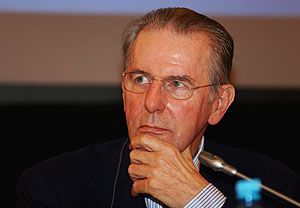Russia must explain how it will implement its controversial anti-gay propaganda law and detail its impact on next year's Sochi Winter Games, Olympic president Jacques Rogge said on Friday.
- Relax about anti-gay rights at Sochi Olympics: Minister
- Actor Fry demands homophobic Russia be stripped of 2014 Winter Games
 The International Olympic Committee want clarification of how the law will be applied, despite having received assurances from Games organisers, Rogge said.
The International Olympic Committee want clarification of how the law will be applied, despite having received assurances from Games organisers, Rogge said.
Russia, hosts of the 2014 Winter Olympics in the Black Sea resort of Sochi, passed the law in June.
The ban has led some to call for a boycott of the Sochi Games. U.S. President Barack Obama has voiced his concern while Puerto Rican IOC presidential candidate Richard Carrion has spoken strongly against the legislation.
At a news conference in Moscow following a meeting between the International Association of Athletics Federations (IAAF) Council and the executive board of the IOC, and ahead of the start of the world athletics championships in the Russian capital on Saturday, Rogge said his body needed clarification over the English translation of the law.
"We have received all reassurances emanating from Mr Dmitry Kozak, who is in charge of the organisation of the Games in Sochi. We asked for written confirmation of these reassurances," said Rogge, who was sitting alongside IAAF president Lamine Diack in the conference hall of the Radisson Royal hotel.
"We received them yesterday, we have studied it this morning but there are still uncertainties and we have decided to ask for more clarification as of today. So we are waiting for this clarification before having final judgement on these reassurances."
On Thursday, Russia's sports minister Vitali Mutko and Diack were unconcerned about the law's potential impact on the world championships which run from August 10-18.
Mutko told a news conference that "all the athletes and organizations should be relaxed, their rights will be protected... but of course you have to respect the laws of the country you are in."
Asked what would happen if an athlete protested against the law during the Sochi Games, Rogge said: "This is definitely something (that) has to be considered case by case so I cannot give you a generic answer."
Critics of the law have said it effectively disallows all gay rights rallies and could be used to prosecute anyone voicing support for homosexuals. President Vladimir Putin also banned same-sex couples from adopting children.
Asked what the IOC specifically needed to clarify on the new legislation, Rogge replied: "We are not clear about the English translation of the Russian law and we want clarification of this translation to be able to understand what has been communicated to us.
"This is about a couple of paragraphs - we don't understand all the details because of probably a difficulty in translation. We don't think it is a fundamental issue, more of a translation issue."
Belgian Rogge, who steps down from the IOC presidency in September after 12 years in charge, said the Olympic charter was very clear.
"It says sport is a human right and should be available to all regardless of race, sex or sexual orientation.
"The Games themselves should be open to all, free of discrimination. Our position is very clear but as we don't have all (the) full details of a good comprehension of the law we cannot make any comment on that."
Putin has made Sochi a top priority for Russia to help its image abroad by propagating it as a modern state with top-notch infrastructure.
But the latest controversy only adds to criticism over cost overruns and accusations of widespread corruption marring the February 7-23 Games.
Photograph: Mark Kolbe/Getty Images












